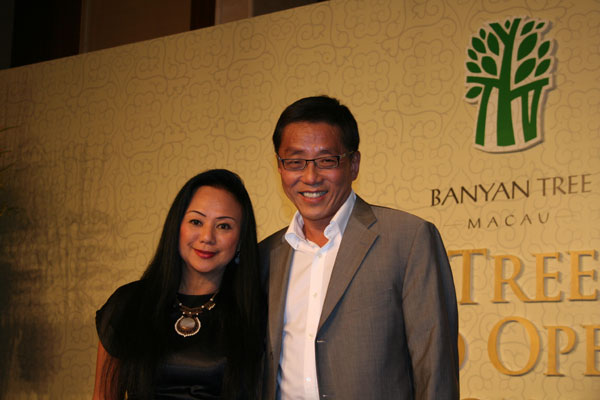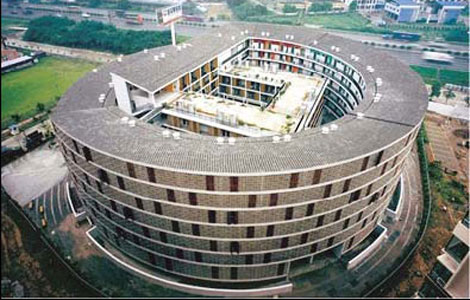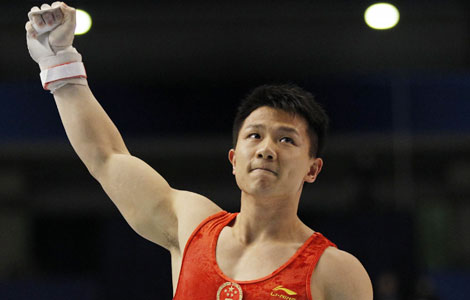Hotel entrepreneur finds adventure in life
Updated: 2011-10-16 07:54
By Donna Mah (China Daily)
|
|||||||||||
|
 |
|
Claire Chiang and her husband and partner, Ho Kwon Ping. Provided to China Daily |
"I married a journalist, not a businessman. I was an educator and teaching at the University of Hong Kong," says Chiang soon after we start our interview. Chiang is the senior vice-president of Singapore-based Banyan Tree Holdings, and is married to the executive chairman of Banyan Tree Holdings, Ho Kwon Ping.
The story of how the Banyan Tree brand came into existence is a story of filial responsibility and the understanding that building a strong Asian brand was the way forward for their business.
Chiang and Ho were living in Hong Kong on one of the idyllic outlying islands, Lamma, when they came up with the name for their resort business. Lamma island has a northern village called Yung Shu Wan (Banyan Tree Bay) and Banyan Tree uses the same character for the company's Chinese name.
At the time, Ho was a journalist for an Asian magazine and Chiang was teaching sociology at the University of Hong Kong. When Ho's father became ill, Ho, as the eldest son, returned home to help run the family business.
In 1994, the couple opened their first Banyan Tree resort in Phuket, Thailand. They were the first to build pool villas, which have become their trademark, though nowadays private-pool villas are found at many different resorts groups and are seen as a benchmark for luxury resorts.
"There is a saying in Chinese which defines success as consisting of three factors - timely opportunity, favorable environment and harmonious relationship. To be more succinct, it is translated to mean to be at the right time in the right place with the right people," explains Chiang about the jump from education to the luxury spa and resort business.
"It was not one-directional or a clear development. A number of coincidences and life encounters in the past two decades opened up opportunities for me which I seized, each time bringing me to a different level of experience and surprises."
Chiang is a woman of many talents. Her honors include being one of the first of two women to be elected to serve on the Board of the Singapore Chinese Chamber of Commerce and Industry, she is a published author, and she has won awards for her community work as well as for her business achievements.
In 1999, Chiang was presented with the "Woman of the Year" award for her contribution to the community in Singapore.
When we met, the main topic of our conversation was "sustainable capitalism" and the programs that had been implemented by Banyan Tree Holdings Limited to support this.
Chiang is the chairperson of Banyan Tree Global Foundation, established in 2009 by Banyan Tree Holdings. In this role, she is charged with directing and guiding the continual process of the company's commitment to their CSR mission to "Embrace the Environment, Empower the People". The group launched three group-wide initiatives as part of their CSR program: Seedlings (a mentorship program), Greening Communities (a tree planting program), and Resource Conservation (reducing energy consumption, potable water consumption, and amount of waste sent to landfills).
Chiang was keen to talk about the mentorship program that is a group-wide initiative to support youths aged between 12 and 18.
"Seedlings" is a three-phase program that provides six-year mentorships for marginalized youth with trained Banyan Tree volunteers, scholarships to enable continued education, and two-year paid internships within the hotel to provide valuable work experience.
Banyan Tree now boasts 12 internal mentors, trained by the University of Wales to conduct the trainer sessions.
"Organizational culture is such that talents may be overlooked, requiring all the more conscious effort by leaders to give women talent the chance to grow. It is not enough to dwell on skill sets and attitudes.
"Very often, women leaders have to be sponsored actively to top positions. Mentorship and sponsorship are important processes to help women to achieve."
Chiang also explains that Banyan Tree works to care for all stakeholders of the company and not just shareholders. This means Banyan Tree is in business to create wealth, but also to improve the communities that they are located in and have "shared wealth creation with stakeholders".
When a Banyan Tree resort is built in a community, Chiang says, the company also helps to build better roads to improve the infrastructure and build hospitals to improve medical facilities. To help fund some of their activities, guests at the Banyan Tree are charged $2 per day, which the Banyan Tree matches. (Guests can opt out if they prefer.)
Chiang's commitment to education and "human capital" is also illustrated by the management academy, spa academy and continuing education online courses that she says Banyan Tree offers its staff.
Thanks to that nurturing approach, some of the core staff have been with the company for as long as 30 years.
"Travel, adventure and romance connected KP and myself," she says of her relationship with her husband.
"Our marital and business development revolved around the romance of travel, especially to far-flung places where nobody pioneered.
"You can say we have a collaborative relationship characterized by tension based on our clear acceptance on agreeing to disagree.."
Near the end of our interview, Chiang and I talk briefly about motherhood. She has three grown children who are 29, 26 and 17.
"When it comes to the family, you really have to keep working at it, to make time for your family. Planning is so fundamental to balance, especially work-life balance,.
Banyan Tree has just opened the Banyan Tree Macao, in the integrated Galaxy Macao resort, this year and the Banyan Tree Riverside Shanghai and Banyan Tree Tianjin will open later this year. By 2015, the company expects to be operating about 20 hotels in China.
You can contact the writer at sundayed@chinadaily.com.cn.
Hot Topics
Libya conflict, Gaddafi, Oil spill, Palace Museum scandal, Inflation, Japan's new PM, Trapped miners, Mooncake tax, Weekly photos, Hurricane Irene
Editor's Picks

|

|

|

|

|

|






